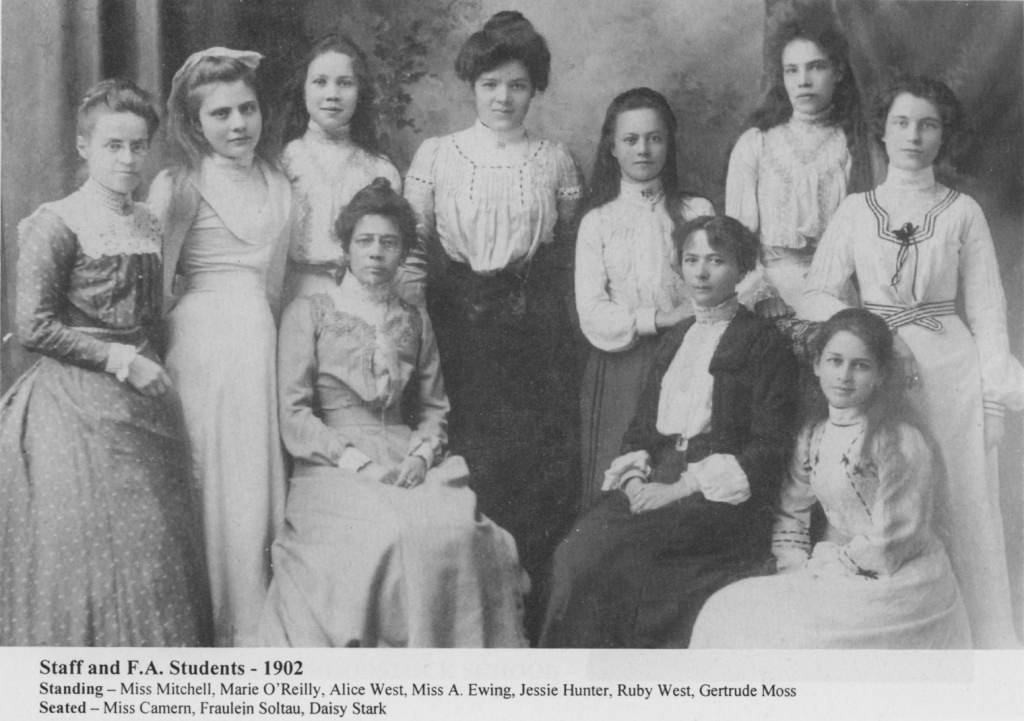
01 Mar From the Archives: Woodstock as a Haven During World War I
The turmoil of World War I (1914-1918) extended far beyond the European battlefields, its ripples reaching the shores of India. British colonial rule fueled anxieties about foreign loyalties, leading to harsh measures against “enemy aliens” – citizens of Germany and Austria-Hungary. Mass internments and forced repatriations disrupted lives, yet amidst this climate of suspicion, the case of Miss Sophie Soltau (teacher 1892-1918) reveals that Woodstock School stood as a beacon of peacebuilding and inclusivity as school colleagues successfully advocated against Miss Soltau’s repatriation. Miss Soltau’s life and timelines have been collaboratively brought into greater focus by Daman Singh (author and daughter of ex-Prime Minister of India Dr. Manmohan Singh) and Archives Consultant Bob Shoemaker.
The story of the collaboration begins with a blog post by Dale Howard ‘67, which drew the attention of Daman Singh. Daman was researching the treatment of “enemy aliens” by the British government of India during the First World War and sought further information about a Woodstock School teacher named Sophie Soltau. Daman and Dale connected, and Dale in turn connected Daman to the Woodstock School Archives.
At the time Dale shared, “My Grandfather, Rev. C.C. Herrmann, was treated as one [enemy alien], although he was an American citizen (but of German extraction). Interpreting some of his intercepted letters as showing “anti-British feelings,” the government denied him re-entry into India after he left for a year of furlough in 1917. He and family then spent a term in the Philippines before being able to return. In the course of her research, Daman came across my blog entry that deals with my grandparents, especially Grandmother Florence’s death in Landour. (She is buried in the Christian Cemetery on the Chakkar.)”
The Case of Sophie Soltau (teacher 1892-1918)
Having made India her home long before the war, in 1914 Sophie Soltau’s nationality suddenly rendered her a potential threat. Daman Singh shares:
“The Government of India introduced various measures to deal with ‘enemy aliens,’ i.e, Germans and Austrians during WW1. For instance, men of military age were interned; others were treated relatively lightly. In late 1915 and early 1916, a large number of men, women, and children were repatriated. However, some had been exempted for ‘special reasons’. Miss Soltau was one of those who were exempted. According to records at the National Archives of India: ‘Fraulein Soltau left Germany in 1878 at the age of 17 and has only returned for a short visit. Her colleagues vouch for her loyalty, and she would strongly object to repatriation. She is said to be indispensable in her post, and she is not in a position to do any harm if she should wish to, as she only teaches adult English pupils and cannot speak Hindustani fluently.'”

Above: Sophie Soltau (middle seated) with fellow teachers and students in 1902 (Source: Woodstock School Vol. 1, The First Century, 1854-1954)
Bob Shoemaker found the following handwritten narrative from Edith Jones (staff 1906-1944; founder of The Quadrangle magazine) in the Woodstock Archives: “The Principals were glad to be able to retain the services of Fräulein Soltau, who, in spite of the German accent which she never lost in her twenty-five years in the School, was a very able teacher of French. ‘Frolaline’ as the servants called her – was, in addition, an exceptionally fine Kindergarten worker, having had as her own instructor a lady who had sat at the feet of the great (Friedrich) Froebel himself. Not only did Fräulein teach the little ones, quite a small K.G. group in those days, but in due course, she organized a K.G. Teachers’ Training department.”
While her year of joining is listed differently in a few sources (1892 or 1894 or 1895), it is clear that she taught at Woodstock for at least 23 years, departing in 1918. Records found by Daman Singh and in the Archives indicate Miss Soltau eventually obtained British citizenship, continuing to live in India and teaching at St. Peter’s in Mumbai and potentially elsewhere. The last records on file in the Archives – from the 1937 Quadrangle – place Miss Soltau in Gwalior.

Above: Miss Soltau listed among Woodstock School faculty in a description of the school’s partnership with Allahabad University in The Allahabad University Calender, 1915. Fun Fact: today’s value of the INR 1,50,000 used to build up Woodstock properties in the early 1900’s would be 1-1.2 crore INR or 120,628-144,731 USD!
Miss Soltau’s work was a testament to the transformative power of learning. She taught French, nurtured young minds in the Kindergarten, and even established a Kindergarten Teachers’ Training department. Her commitment during a time of global tension demonstrated Woodstock’s institutional and community conviction that education fosters understanding and bridges divides.
Miss Soltau’s legacy is part of a common thread that has been consistently woven into our institution over the years: peace built on the foundation of teaching and the recognition that our commonalities outweigh our differences.






No Comments